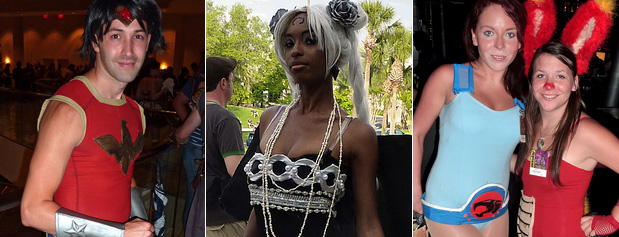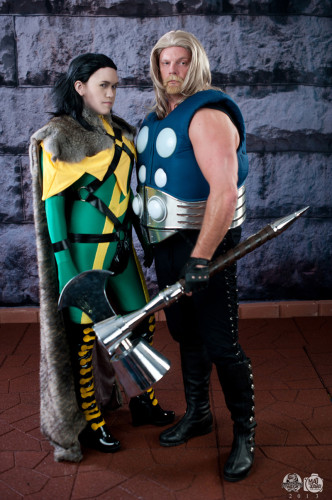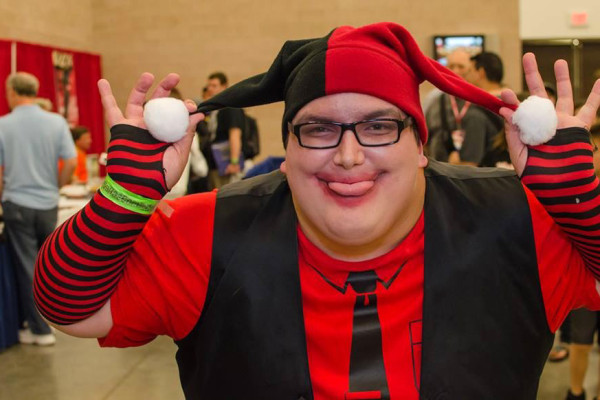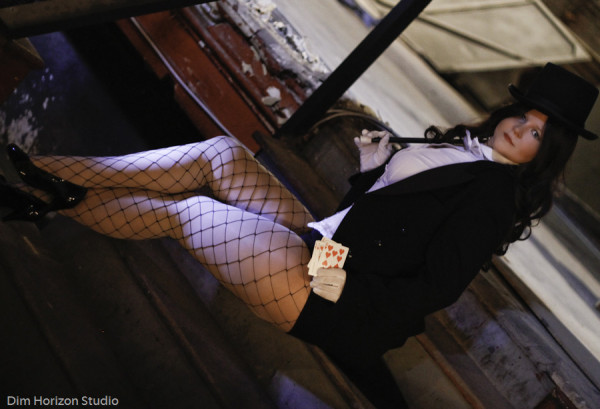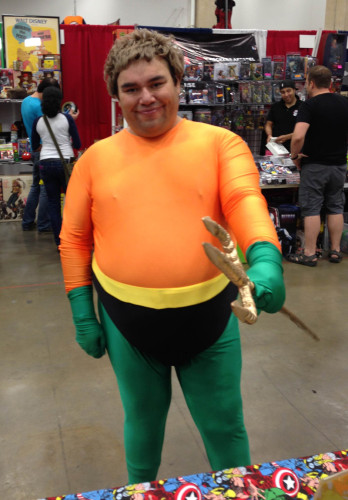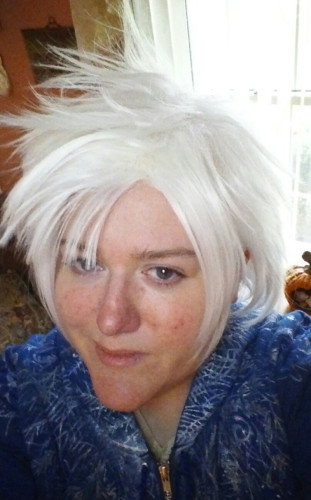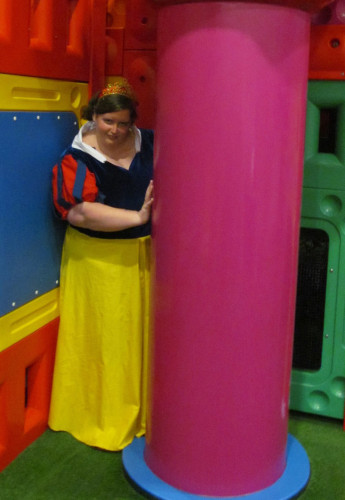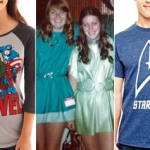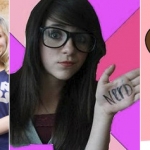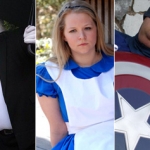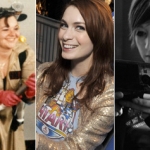Cosplay is a way for people to express their fandom by costuming and performing as their favorite characters. This process requires dedicated research to a character’s background and the details of their appearance and mannerisms. Cosplayers spend many hours constructing, sewing, and tweaking to get details as accurate as possible. Over the past few years, discrimination has raised its ugly head over this fan community. The public nature of the display of their fandom is seen by some as an invitation to voice opinions freely. These sorts of opinions, more often than not, fall on the derogatory side of the line. Some of the hotly debated issues online include racial discrimination, gender or “cross-play” bashing, and size shaming.
From our roundtable (note: see previous article for introductions to our participants!), no one has ever experienced or witnessed racial discrimination while representing a character. However, it only takes a Google search to see that racial discrimination has infiltrated the world of cosplay. The main discrimination cosplayers of various races encounter is being told they are the “wrong” race for a character. Cosplayers of color are criticized for adopting “white” character personas, while white cosplayers are accused of brownfacing or whitewashing if they choose to emulate a character of color. When called on the discriminatory nature of such remarks, the biggest defense people offer is that it’s an accuracy thing. Shouldn’t a cosplayer’s desire and effort to bring a certain character to life be the most important, focused-on qualities? A character that likely has meaning for that person no matter the color of the skin? Even though there are publishers and illustrators striving to bring diversity to the industry, the vast majority of comic book, anime, and video game characters remain white or East Asian.
Crossplay is a newer trend in the cosplay community. It’s when a person of one gender cosplays a character of another gender. There are two basic forms: the crossplay, where the character is represented as true as possible to the original, and the “femme”, where a female cosplayer reimagines a male character in a feminine style. The different incarnations of The Doctor from Doctor Who have become popular characters for cosplaying femme versions. The character Loki has become popular for both crossplay and femme versions. For the ladies, the biggest misunderstanding is why they would want to be seen as a male character. For guys who crossplay, that misunderstanding arises from the idea that if they are doing it, they must be transgender or gay. Otherwise, why would they want to be seen as a female unless they are doing it for laughs? Several of our roundtable dress as characters that are crossplay and/or femme characters.
Have you ever been a victim of or been a witness to someone in cosplay being judged negatively based on gender or crossplay?
Wolfen M (crossplays several versions of Loki and Jack Frost): “The worst I can recall is encountering people here and there wondering, more curiously than anything, why so many male Lokis are played by women. There are those who don’t grasp the concept of crossplay and ask if we’re Lady Loki when we’re obviously playing the male version, because something tips them off that we are biologically female. It’s not a matter of being malicious, though.”
Kristen: “I cosplay frequently as male characters even though I am female, so I am often met with questions and comments harping on that fact. A lot of times people will come up to talk to me thinking I’m a man, and it ends up my voice gives me away. It’s been disheartening at times because someone will be very excited to see me, and then suddenly seem very offended or off-put that I’m not what they at first thought. Thankfully, it has never escalated into anything more than a few snide comments or odd looks.”
Jeff: “I’ve been judged on my size and gender once because I decided that so many girls dress up as Harley Quinn, so I thought what Harley Quinn would look like as a guy. I went to one of the conventions dressed as my male version of Harley. Some people got it and loved my creativity, but to other people, I was the weird guy who was dressed in a costume they didn’t understand. When I tried to help them understand they either didn’t get it or said OK, that’s weird. They would ask, why didn’t you go as the Joker? I would tell them I’m trying to do something out of the box and different.”
Jackie: “I have seen this [bashing of crossplayers]. Most are directed toward the “slutifying” of male characters. The male versions of female characters go down well in the community in my view.”
By far, the hot-button controversy over cosplayers is body shaming. Should anyone feel free to cosplay any character they want or should they stick with a character that “fits” their body? It’s the argument of should only women with a model-esque build or guys with a body builder physique cosplay certain characters, such as superheroes, or should people cosplay any character that inspires them? Size shaming directed at larger cosplayers of all genders has become rampant both within and outside the cosplay community. Women and girls who cosplay characters that are drawn with or portrayed with skimpy clothing are often accused of only trying to draw attention to their body.
If one judges cosplay based strictly on the illustrations and portrayals of characters, it’s impossible for any living person to “accurately” portray the character. Everyone cosplays out of body type. Comic book and anime characters are often drawn with unrealistic body proportions, both for male and female characters. The hyper-sexualized, barely-clad female is the norm rather than the exception. It’s a business. The publishers and producers are trying to sell a product. The look appeals to the straight male portion of the buying audience. The attitude of the character — fierce, independent, strong, confident — appeals to the female audience.
Body/fat shaming is one issue all of our roundtable has had experience with.
Have you ever been a victim of or been a witness to someone in cosplay being judged negatively based on size?
Jeff: “I’m a big man… I don’t care what people think, though. I actually feel more comfortable in costume than I do in regular clothes. I freely believe it exists [prejudice against larger cosplayers]. I know people pick on others for their size in cosplay. To me, as long as you have fun with it, it should not matter if you are exact or not.”
Katie: “I’ve not had to deal with it nearly as much as some. My weight has fluctuated in years past, so I have seen things from both sides. I was never skinny enough to get the “eat a cheeseburger” like others get, but I have been big enough to get the “put down the cheeseburger” comments. A lot of my male friends are just as concerned about their weight in a costume as the girls are. While we ladies seem to be bombarded about the size of our stomachs, arms and thighs, the guys get a lot of comments about not being muscular enough to fill out that superhero physique.”
Jonathan: “At a convention, I decided to wear my Aquaman Halloween costume from 8 years ago. A local morning show showed a clip and the guy said that Aquaman had eaten too many burgers and tacos. Apparently, one lady wrote an e-mail to the station, and they decided to make a big deal about it. They tracked me down and asked me to “confront” him on the show. I did and that is where my Aquaman persona took off.
I have been the victim of many people’s fat jokes both to my face and behind my back. I shrug it off. I have been called a fa**ot and gay on Facebook. I always have friends quick to defend me. Sometimes it gets to me a little. I’ve survived four strokes, so a little name-calling doesn’t hurt. I’ve been honored by several charities for my community service. Those who know me love me, and that’s all that matters. I am a large, 38-year-old straight male.”
Wolfen M: “Thankfully, I haven’t been subjected to any myself, despite my weight. I’ve been my own worst critic there. I did once discover a despicable forum devoted to making fun of others; someone had reposted a picture I had taken of a plus-sized cosplayer and was saying horrible things about her. Every now and then, I will hear people in crowds at cons quietly express disgust at someone playing characters in costumes that the speaker feels doesn’t suit the cosplayer’s body (but, of course, they aren’t usually that tactful). I’ve never seen things said to a person’s face, though. The worst of what I’ve encountered has been stories in articles, Tumblr posts, etc., and comments posted to them.”
Kristen: “I have also been told a few times that I wasn’t thin enough for certain costumes I’ve done. I’ve also witnessed negative comments directed at fellow cosplayers for not being the “body type” of the character they are cosplaying as well.”
Jackie: “I have been a victim of this. I’m not small so I’m never going to be the same size as anyone I aspire to cosplay. People make looks and comments about this often and in doing so, take much of the community and self-esteem out of larger cosplayers. Cosplaying isn’t about the size you are, it’s about showing your love for the character you’re portraying and becoming someone else to become who you are. This judgment doesn’t just come from those outside the community, but also from the community itself.
As soon as a large person cosplays a skinny character, the effort and skill put into that costume goes out the window. Sure, many people try and look at skill and effort over size, but if a skinny person wore the same costume, the majority will think the skinny person looked better. [The attitude]’s getting better; I will admit it’s not as bad as it once was.”
There are some factions within the cosplay community who are critical of other people for body type. And beyond body type, the community seems to have developed more of an “elite” attitude for some. The stronger criticism within is the quality of the work and the chosen representation of the character. The predominant amount of fat/slut-shaming and ridicule is coming from the audience — those folks who attend cons to search out and give attention to cosplayers, like photographers and media, gawkers and stalkers, creepers and peepers. All these groups treat cosplayers as if they were an attraction in a zoo. There are Facebook pages, Tumblrs, forums, and other websites dedicated to shaming cosplayers for body type and size, and others’ opinions on the quality of the costume or the attractiveness of the cosplayer. People who create and post on these sites hide behind the First Amendment “free speech” right to cover their indulgence in and enjoyment of cyber-bullying others. More times than not, pictures featured on these sites are trolled from other cosplay sites that are supportive of all cosplayers.
Cosplayers are taking a stand. One of the popular catchphrases for the community is “Cosplay is for Everyone”. More websites are dedicated to body, gender, and racial positivity for all cosplayers than not. A majority of cosplayers want the community to be an inclusive one, and are working together to achieve that goal. Nerds/geeks have experienced bullying from non-nerds/geeks for most of our lives. No one needs that element of society brought into the fandoms. The attitude of self-appointed cosplay critics reflects a belief that because cosplayers express their fandom in a visual way that they are seeking the attention of others. I’ve got some news for you: none of them are doing it for your pleasure or approval.
Next time, we will ask our roundtable to comment on harassing and inappropriate behavior displayed by cosplay “fans”.


